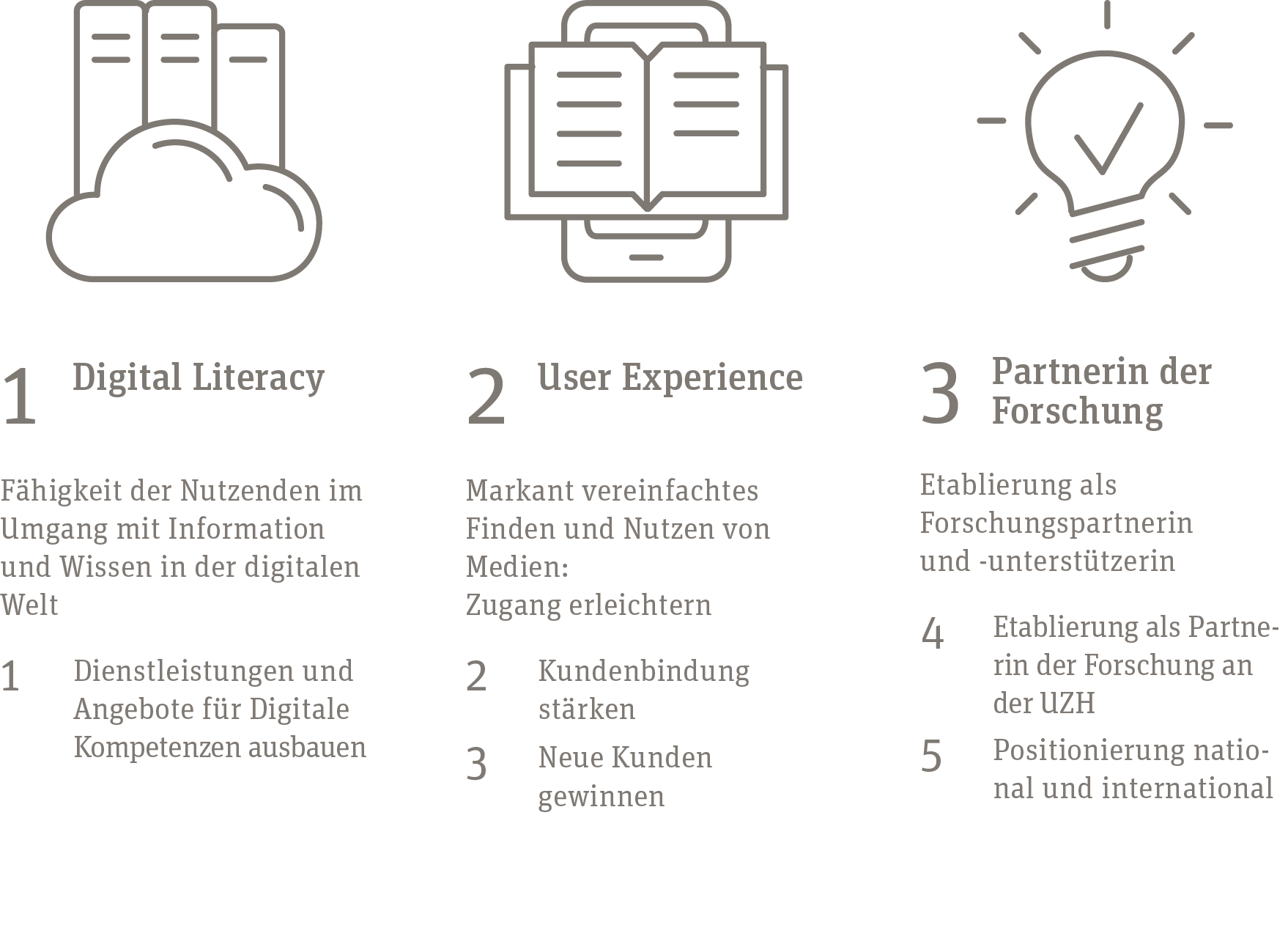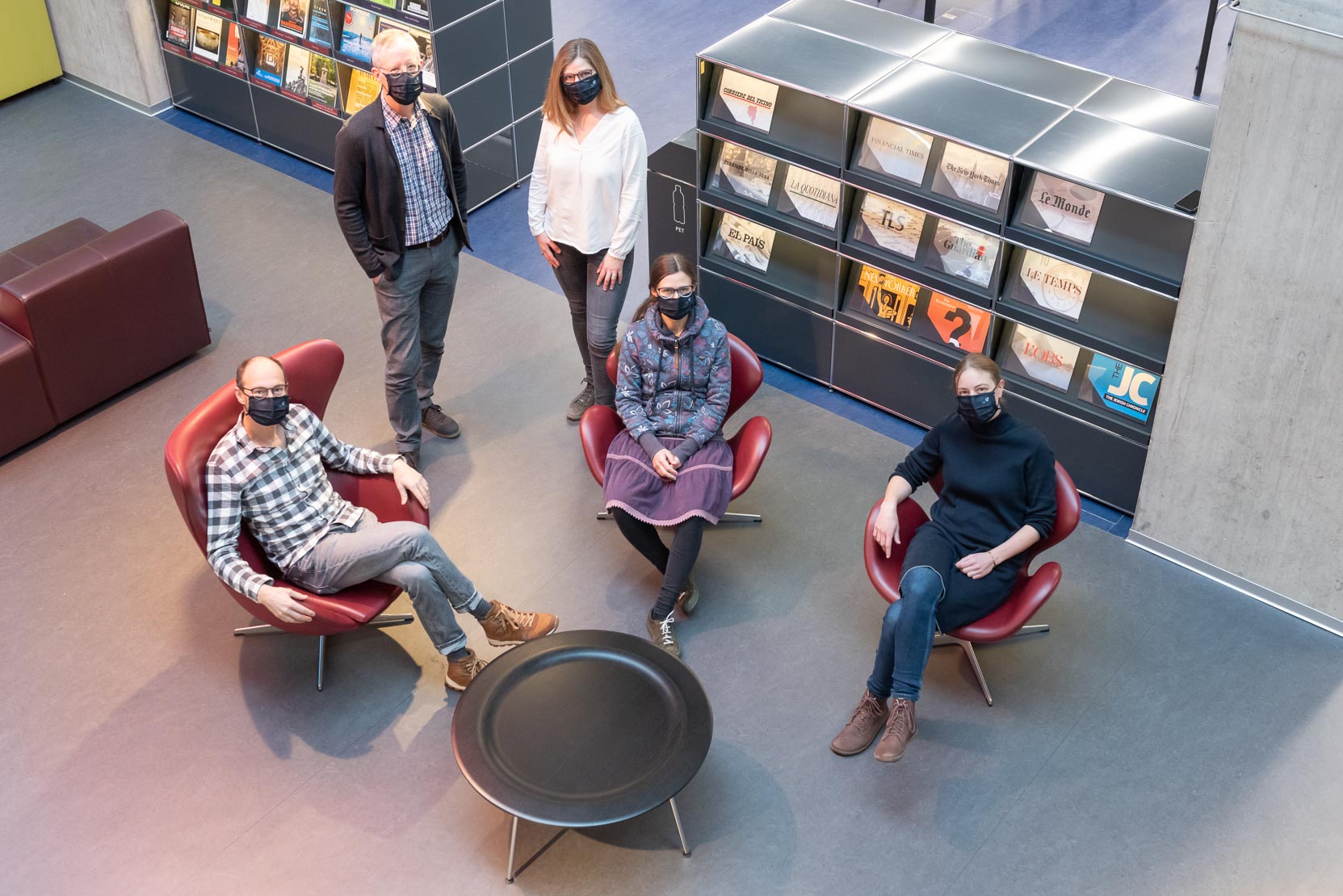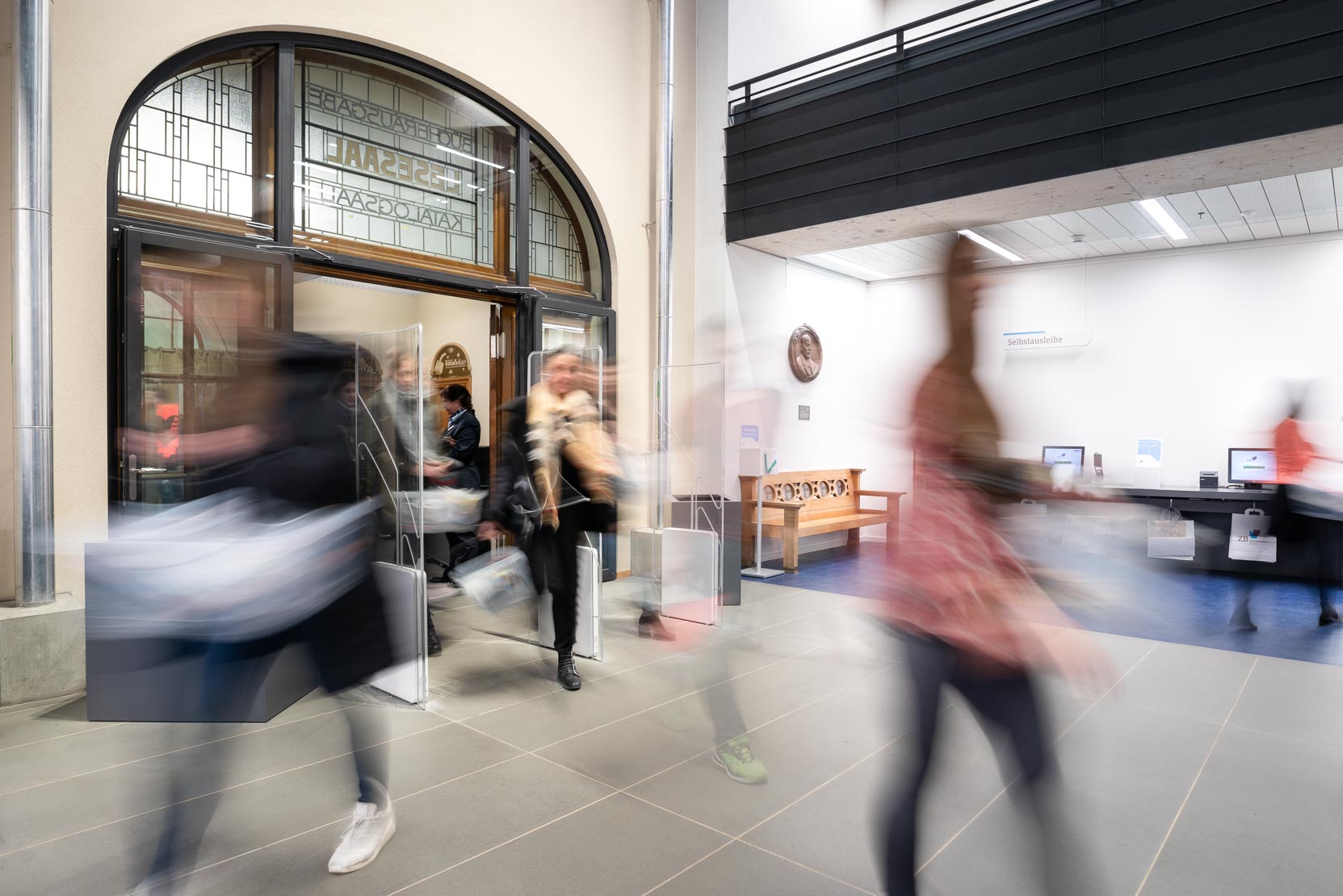2024 strategy
«The ZB: a compass for handling knowledge in the digital world»
Aus dem Projekt Aufbau Universitätsbibliothek Zürich (AUB) ging eine intensive Zusammenarbeit zwischen der Universitätsbibliothek Zürich (UB) und der Zentralbibliothek Zürich (ZB) hervor. Diese enge organisatorische Verflechtung entstand durch die gemeinsame Verantwortung für die bibliothekarische Versorgung der Universität Zürich (UZH) und wird nun durch eine gemeinsame strategische Basis ergänzt. Die gemeinsame Strategie 2024 bis 2027 gilt für das Gesamtsystem UB und ZB. Sie bezieht sich somit sowohl auf unsere Funktion als Universitätsbibliothek als auch auf jene als Kantons- und Stadtbibliothek.
Strategic background
The traditional task of libraries has been changing for some time: society’s greatest challenge is no longer gaining access to knowledge, but rather handling information and knowledge adeptly and improving orientation amidst the endless volumes in circulation. Accordingly, the role of libraries as central hubs for information and knowledge must also change. With its wide-ranging portfolio, the Zentralbibliothek Zürich – one of the biggest libraries in Switzerland and the cantonal and city library for the centre of education and science that is Zurich – has a responsibility to take an active and leading role. At the same, time, people’s habits and needs when searching for, acquiring and processing knowledge are also changing. Young people today rely on different media and sources from earlier generations. YouTube, social media, Wikipedia and Google are consulted as a complement to – or even replacement for – books and articles. Here, libraries are losing their unique status as providers of information and knowledge. In the academic sphere, research projects are becoming more and more complex, and professional handling of research data is increasingly becoming a prerequisite for their success. New solutions are required to structure, publish and archive research data, and researchers need appropriate support. Both in Switzerland and elsewhere, growing numbers of academic libraries are playing a central role and positioning themselves as capable partners for research.
Our vision
« The ZB: a compass for handling knowledge in the digital world»
Our vision expresses our desire to exert influence and help to shape libraries’ new role from the outset. Our societal responsibility with regard to managing information and knowledge in a changed environment is one we take seriously. We believe it is essential that the ZB, as a neutral institution with a tradition that lends it the required credibility, reliability and stability, should play a pivotal role and act as a “compass”. That responsibility gains greater significance through the strategic cooperation with the University Library of the University of Zurich (UBZH), which commences operations in 2022. The aim of providing “a library offering for members of the UZH”, which will connect the two institutions together, also guides the ZB in its vision, which is supported by its 2021–2024 strategy. We regard a commitment to securing knowledge under the conditions of the digital world as a fundamental building block of our shared mandate to provide an optimal, future-oriented supply of information for the UZH.

Our three strategic focus topics
Our strategic analysis led us to identify three focus topics which in essence delineate the 2021–2024 strategy. They will steer the direction of our activities for the years ahead and will thus act as guidelines for managers and staff. The focus topics are geared to the ZB’s desired future positioning and are deliberately visionary and ambitious. They describe multifaceted challenges that also have still unknown aspects. What they have in common is that they demand a fundamentally new approach. We expect implementation to extend beyond the present strategy period, but with initial projects being successfully implemented by 2024. The first two focus topics in particular are relevant with regard to the ZB’s university mandate and for its role as a cantonal and city library. The strategy thus serves all institutional mandates in equal measure.
1. Digital literacy
The first focus topic is primarily directed towards users’ ability to handle information and knowledge in a digital world. The idea is not so much that the ZB should offer additional training in using databases or search portals, but rather that it should develop new, innovative services that help users acquire the skills needed to work with digital knowledge and obtain information without assistance, in ways that are effective and geared to their needs. Against the backdrop of changed information behaviour among broad sections of the population, we regard this as a task of great societal importance, and one that adds an important additional dimension to the ZB’s role as an educational institution in the canton and city of Zurich.
2. User experience
The second focus topic emphasises a consistent customer orientation. We aim to substantially simplify the tasks of searching for, finding and using information, in order to continue to attract and retain future generations as users. By its nature, the digital world offers the potential for interlinked, intuitive and seamless information gathering and use. At the same time we are aware that, in view of multiple contingencies, it will not be easy to fully deliver that quality for our customers in the ZB’s offerings. For example, use behaviour with respect to externally licensed information products is often prescribed in advance, and the scope for influencing it is limited. Nevertheless, the ZB’s goal is to make searching for, finding and using information as quick as possible, employing innovative solutions to do so.
3. Partner for research
The ZB already provides specific services to support various research projects at the University of Zurich and other higher-education institutions. It has in-depth knowledge and extensive experience of, for example, digitising sources and handling metadata. Building on this, we aim to establish ourselves further as a partner for research – primarily at the UZH but also at other universities and research institutions in Switzerland and internationally, and to broaden our sphere of activity. Guided by the needs of research in the humanities and social sciences, we aim to help orient the research system towards the principles of “open science” with tailored services and efficient infrastructures; extend the capabilities required to do so; and enter into sustainable cooperations.

Our five strategic action areas
In order to drive forward the implementation of our strategy, we will concentrate over the next four years on five strategic action areas. These will help us advance the transformation process required to address the focus topics outlined above.
1. Expand service offerings for digital literacy (Focus 1)
The ZB will expand existing services and create new ones designed to enable the general public of the city and canton of Zurich as well as university members to handle information and knowledge even better and more efficiently in the digital world. The new offerings will be developed as part of the implementation phase on the basis of the innovative knowledge transfer products introduced in recent years. Existing services such as individual advice and digital training will be expanded and strengthened. They will be complemented by the liaison services for institutes and faculties that are to be developed jointly with the UZH University Library.
2. Enhance customer loyalty, simplify information access (Focus 2)
We aim to expand our existing customer segments and increase their use intensity by means of two approaches. The first involves aligning the structure of our holdings even more closely with the demands of users, so that usage levels can be maintained and, where possible, increased. This will mean conducting in-depth analyses of use behaviour and purchasing media more frequently at the instigation of customers. Content that is in high demand is to be made available in digital form wherever possible, and opened up to users who are not university members. The second involves further improving the user-friendliness of search environments, presentation and access. As outlined in the focus topic “user experience”, searching, finding and using are to be made as simple as possible. That means reducing to the minimum the time between publication and availability in the library. In addition to the holdings, the other services are to be further developed with an eye to systematic customer orientation.
3. Attract new customer groups (Focus 2)
We see potential for attracting previous non-users to the ZB’s offerings, examples being customer segments such as the city’s international community, educators, people in ongoing training and further education, and lifelong learners. We aim to systematically identify how such groups can be motivated to use the ZB and whether we need to adapt our offering to achieve that; possible actions include gearing our holdings to demand, extending our opening hours, providing individualised services and attractive cultural offerings, and making the ZB a more attractive place to spend time.
4. Establishing the ZB as a partner for research (Focus 3)
The ZB has valuable resources and specialised expertise, and we aim to encourage UZH researchers to make even greater use of them. The library can provide ad-hoc or comprehensive support at every point in the lifecycle of a research project: from proposal development and identifying infrastructure requirements to data generation, structuring and curation, sustainability planning and even advice on the legal aspects of digital research. The ZB will push ahead with the development of tailored offerings, working closely with the future UZH University Library and research operators. It will also support citizen science projects driven by a participatory, socially open conception of science, developing its own activities and seeking partnerships.
5. Positioning as a national and international research partner (Focus 3)
Although the relationship with the UZH is of prime importance and accounts for the vast majority of research services, the ZB also stands ready as a partner for research projects in the humanities and social sciences at other universities and research institutions in Switzerland and elsewhere. This makes particular sense given the nature of the ZB’s collections and its extensive holdings of unique objects. However, the ZB also has subject expertise in other topics related to Zurich and Switzerland, and intends to make these more widely known. The ZB will also engage in cooperations to construct infrastructure in support of research and to develop standards and practical criteria for digital scholarship.

How we will implement the strategy
The focus topics and action areas set out above require a process of change and development that has already begun and will impact every part of the library. We need to formulate responses to the fundamentally changed way in which information and knowledge are handled in the digital world, so that the ZB can, as a public academic library, cement and enhance its relevance in an era of digital transformation. Four principles serve as the basis for implementing the strategy, and are designed to ensure the success of the change process:
Entering into cooperations
Wherever possible, the ZB will seek partners for projects of larger scope. We believe that in a digital world, results can only be achieved by collaborating and achieving the necessary critical mass. Given the propensity for large global corporations to control the supply of information and knowledge virtually on their own, libraries and information institutions can only compete if they work together. At the same time, however, actors from the private sector can under certain circumstances function as enabling partners, and the ZB is open to this.
Acquiring additional skills
Many of the skills that have been required for a library’s operations until now will continue to be needed in future, but the job specifications of its staff will increasingly change. The ZB specifically intends to enhance the capabilities and development potential for its employees, and adapt job profiles to reflect new demands. It aims to encourage and support a willingness to change. However, entirely new skills in areas such as the user experience will also be required, which can in part be obtained by recruiting outside specialists or lateral entrants. Experience gained in other institutions and sectors can be valuable to the library.
Further developing the organisation
The strategy outlined above will also entail internal change. Like all organisations operating in a market environment, the ZB focuses on maximising the value added for its customers: if we are perceived as valuable and our services are widely used, we will retain our relevance over the long term. The organisation must align its structures and processes towards creating the best possible conditions for that, and place the concept of value added at the heart of what it does. Reviewing the ZB’s organisational structure against that yardstick and developing it further are therefore integral to implementation of the strategy.
Systematic customer orientation
The strategy as a whole, as well as the individual topics and action areas, places the greatest importance on the benefits for the customer. This is to be an explicit maxim of the strategy’s implementation. In future, we will therefore talk more regularly and intensively with our customers, in order to understand their use behaviour, challenges and needs. On that basis, we can develop the offerings in all areas that deliver the greatest possible benefits.



